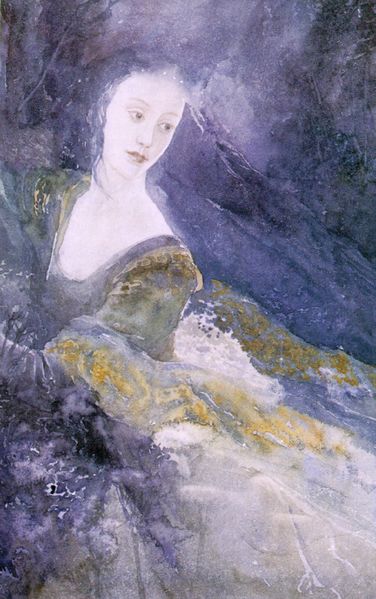
Are adventures only for bachelors?
By Gibbelins
Have you ever thought it odd that everyone in the Fellowship is single? Many of them marry after the adventure is over, but none of them have families at home while they are on the quest. On several occasions, Tolkien seems to make a particular point of Bilbo and Frodo’s bachelorhood, without ever explaining why it might be important.
But in the Quest of Erebor, Gandalf gives some inkling of its significance when he is describing why he singled out Bilbo for the journey (Unfinished Tales, 331):
I learned that he had never married. I thought that odd, though I guessed why it was… I guessed that he wanted to remain “unattached” for some reason deep down that he did not understand himself –- or would not acknowledge, for it alarmed him.
He wanted, all the same, to be free to go when the chance came, or he had made up his courage.
So if Bilbo had become “attached,” would he not have been free to go on adventures? If so, it seems a little unfortunate, that a wife would act as some sort of anchor, preventing a man from being “free” to do as he wills.
But Finrod Felagund also seems to support Gandalf’s sentiment:
Now Finrod Felagund had no wife, and [his sister] Galadriel asked him why this should be; but foresight came upon Felagund as she spoke, and he said: ‘An oath I too shall swear, and must be free to fulfill it, and go into darkness.’(Silmarillion, 130).
I can well imagine that Tolkien would have considered it irresponsible for a man to willingly depart on a dangerous adventure if he leaves behind a family that might be helpless if he does not return. (A cursory knowledge of Tolkien’s own childhood might assist that belief, but I will not dwell on biographical details here; I prefer to stick to the evidence in his stories.)
The legendarium is full of characters who leave behind their loved ones to go into danger.
Fëanor seems to have no compunctions about abandoning his estranged wife Nerdanel and taking their sons with him. Indeed, in some versions of the story, he comes off as rather malicious, intentionally depriving her of her children out of spite that she is not obedient enough to him (The People of Middle-Earth, “The Shibboleth of Fëanor”).
 Many of the Noldor follow Fëanor’s example and leave their loved ones behind in Aman, but I do not think we are meant to take Fëanor as a role model; certainly the Noldor do not profit by that path.
Many of the Noldor follow Fëanor’s example and leave their loved ones behind in Aman, but I do not think we are meant to take Fëanor as a role model; certainly the Noldor do not profit by that path.
A better example might be Beren, who tries but fails to leave Luthien behind on multiple occasions. The first time he leaves without her, he ends up being imprisoned almost immediately and must be rescued by Luthien. And yet he still tries to leave her behind a second time. Fortunately for him, Luthien will not have it. She repeatedly insists on going with him: “On either road I shall go with you, and our doom shall be alike” (177). It is a good thing Beren listens; he would not have gotten far without Luthien.
Eärendil also regularly leaves Elwing behind to sail off in search of the “Straight Road” to Valinor. But his absence ends in disaster. He ends up being away from home when the Havens of Sirion are attacked, and thus his children are taken captive, and his wife Elwing barely escapes. Only then, with Elwing by his side, does Eärendil finally find what he seeks.
So perhaps the message is not really that you must remain “unattached” if you want to go on adventures.
A better message would be: take your lover with you on all your adventures! You’re probably going to need her (or him).
Gibbelins is a librarian with a degree in linguistics and an abiding love for Tolkien. You can read more of Gibbelins’ features on Tolkien topics over on the io9 observation deck.


